Annexation of Crimea may refer to:

Crimea is a peninsula in Eastern Europe, on the northern coast of the Black Sea, almost entirely surrounded by the Black Sea and the smaller Sea of Azov. The Isthmus of Perekop connects the peninsula to Kherson Oblast in mainland Ukraine. To the east, the Crimean Bridge, constructed in 2018, spans the Strait of Kerch, linking the peninsula with Krasnodar Krai in Russia. The Arabat Spit, located to the northeast, is a narrow strip of land that separates the Syvash lagoons from the Sea of Azov. Across the Black Sea to the west lies Romania and to the south is Turkey. The population is 2.4 million, and the largest city is Sevastopol. The region has been under Russian occupation since 2014.
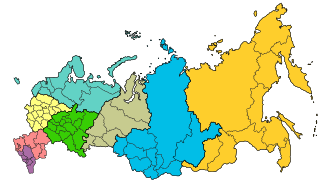
The federal districts are groupings of the federal subjects of Russia. Federal districts are not mentioned in the nation's constitution, do not have competences of their own, and do not manage regional affairs. They exist solely to monitor consistency between the federal and regional bodies of law, and ensure governmental control over the civil service, judiciary, and federal agencies operating in the regions. The federal district system was established on 13 May 2000.

The administrative divisions of Ukraine are under the jurisdiction of the Ukrainian Constitution. Ukraine is a unitary state with three levels of administrative divisions: 27 regions, 136 raions (districts) and 1469 hromadas.
Ordzhonikidze was the surname of Soviet political leader Grigoriy Ordzhonikidze, after whom several places in the USSR were named.
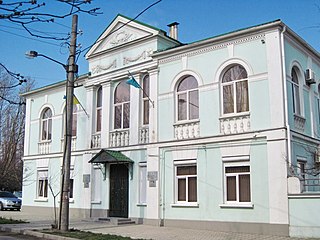
The Mejlis of the Crimean Tatar People is the single highest executive-representative body of the Crimean Tatars in period between sessions of the Qurultay of the Crimean Tatar People. The Mejlis is a member institution of the Platform of European Memory and Conscience.

Perevalne is a village in Crimea, a disputed territory recognized by a majority of countries as part of Ukraine but administered by Russia as the Republic of Crimea. The village of Perevalne is administered by the Dobre Village Council, which in turn is subordinate to Crimea's Simferopol Raion (district) authorities.
The Crimean War was fought between the Russian Empire and the Ottoman Empire from October 1853 to March 1856.
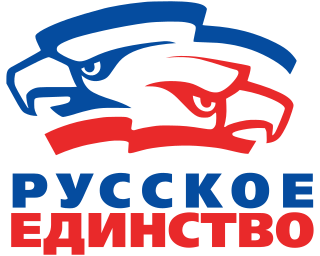
Russian Unity was a political party in Crimea, registered in October 2008. A Kyiv Court banned the party "from activity on the territory of Ukraine" on 30 April 2014. Party leader Sergey Aksyonov was instrumental in making possible the annexation of Crimea by the Russian Federation. The party was based in Crimea, which has a Russian-speaking majority. The party was dissolved on 5 May 2014.

The 40th G7 summit was held 4–5 June 2014 in Brussels, Belgium. It was originally scheduled to be held as the "40th G8 summit" and be hosted by Russia in the Black Sea resort of Sochi. However, Russia was excluded from the grouping due to its annexation of Crimea and the remaining members chose to hold the summit instead in Brussels.

The Autonomous Republic of Crimea is an administrative division of Ukraine encompassing most of Crimea that was unilaterally annexed by Russia in 2014. The Autonomous Republic of Crimea occupies most of the peninsula, while the City of Sevastopol occupies the rest.

In February and March 2014, Russia invaded the Crimean Peninsula, part of Ukraine, and then annexed it. This took place in the relative power vacuum immediately following the Revolution of Dignity. It marked the beginning of the Russo-Ukrainian War.

The Republic of Crimea is a republic of Russia, comprising most of the Crimean Peninsula, but excluding Sevastopol. Its territory corresponds to the pre-2023 territory of the Autonomous Republic of Crimea, a de jure subdivision of Ukraine. Russia occupied and annexed the peninsula in 2014, although the annexation remains internationally unrecognized.

The territory of the Crimean Khanate was annexed by the Russian Empire on 19 April [O.S. 8 April] 1783. The period before the annexation was marked by Russian interference in Crimean affairs, a series of revolts by Crimean Tatars, and Ottoman ambivalence. After the annexation, Russia began a long-term policy of de-Tatarisation, colonising the lands of the former Crimean Khanate, pushing out the indigenous Crimean Tatar population and settling Slavs.
Crimea. The Way Home is a Russian propaganda television documentary about the annexation of Crimea by the Russian Federation in 2014. The film premiered both on Russian channel Rossiya 1 and on YouTube on March 15, 2015.
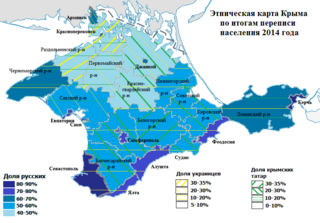
The Crimean Federal District census, transliterated as Perepis naseleniya v Krymskom federalnom okruge, was carried out in Crimea by Russia in 2014, following its annexation by Russia. The census found the total population to be 2,284,769 inhabitants.
The Constitution of the Republic of Crimea is the basic law of the Republic of Crimea as a claimed federal subject of Russia formed in the aftermath of the annexation of Crimea by the Russian Federation. It was ratified on 11 April 2014. Its purpose is to replace the Constitution of the Autonomous Republic of Crimea based on the premise that it was repealed by a referendum during the 2014 Crimean crisis. The Ukrainian government and the majority of the international community do not recognize the annexation of Crimea by Russia and regard the Constitution of the Autonomous Republic of Crimea as active.
The KFS Premier-Liga or simply Crimean Premier League is a professional association football league in Crimea organized by the Crimean Football Union and devised by Russia after UEFA refused to allow Crimean clubs to switch to the Russian leagues in the wake of the 2014 Russian annexation of Crimea.

Russian irredentism refers to territorial claims made by the Russian Federation to territories that were historically part of the Russian Empire and the Soviet Union, which Russian nationalists refer to as the "Russian world". It seeks to politically incorporate ethnic Russians and Russian speakers living in neighbouring territories outside Russia's modern-day borders. This ideology has been significantly defined by the regime of Vladimir Putin, who has governed the country since 1999.

The government of Transnistria, a breakaway state internationally recognized as part of Moldova, has requested annexation by Russia numerous times. Transnistria is a territory that separated itself from Moldova due to fear of a possible unification of the latter with Romania. This sparked the Transnistria War, in which Russian-backed Transnistria managed to stay separate from Moldova. Despite this, today Transnistria is legally and internationally considered part of Moldova.
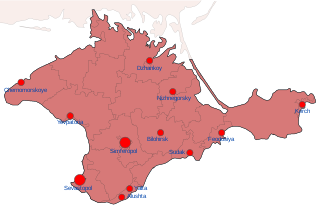
On 27 February 2014, unmarked Russian soldiers were deployed to the Crimean Peninsula in order to wrest control of it from Ukraine, starting the Russo-Ukrainian War. This military occupation, which the Ukrainian government considers to have begun on 20 February, laid the foundation for the Russian annexation of Crimea on 18 March 2014. Under Russia, the Ukrainian Autonomous Republic of Crimea was replaced by the Republic of Crimea, though the legitimacy of the latter is scarcely recognized internationally.